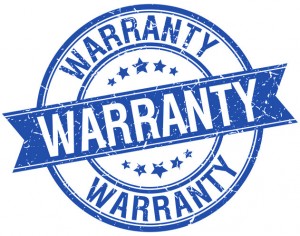If you purchased an extended warranty, that information probably just added more inches to your paperwork. The bottom line is that most of us simply don’t read the fine print until we encounter a problem.
In the case of HVAC equipment, ignoring your warranty can lead to problems—especially if you suddenly have to address an unexpected and costly repair. Our professionals at Roberson Air Conditioning want to be sure you understand your warranties, what is covered, and what you need to do to keep them valid for as long as possible.
What Are HVAC Warranties?
The two common types of HVAC warranties are an equipment manufacturer warranty and an extended warranty provided by an HVAC professional.
The first warranty is provided by the manufacturer of the actual equipment such as an air conditioning system or furnace. These are limited warranties, which means they only cover major parts and systems.
They usually require that an HVAC professional determines a failure was due to a manufacturer defect. Minor parts such as capacitors, contactors, and filters are expected to be replaced as part of ongoing maintenance costs and are not covered. Manufacturers do not have control over installation and maintenance, and therefore will not guarantee any labor.
The second warranty is offered by an HVAC professional, and it’s known as an extended warranty because it “extends” the manufacturer’s warranty. This is available for an extra charge; however, an extended warranty will cover both parts and labor for a longer period of time.
Combined with the original manufacturer warranty, extended warranties can provide a great deal of long-term protection for your HVAC system if you experience problems. According to Consumer Reports, the savvy shopper needs to do their homework on the product’s reliability before deciding on an extended warranty.
Five Common Ways to Void a Warranty
Ideally, you should read your manufacturer and extended warranties carefully. Certain actions or failures to do particular things can lead to a voided warranty. Nearly all warranties will be voided if any of the following five things occur:
1. No registration. Manufacturers need to know who purchased which product and when in order to warranty it. That’s why you will typically need to complete a registration form in paper or online to activate a manufacturer’s warranty.
2. Purchasing off-brand replacement parts. Although it’s tempting to find the lowest cost replacement part, don’t do it if your equipment is still under warranty. It’s understandable that the manufacturer can’t control the quality or effect of an off-brand’s parts and their performance in the overall system.
3. Improper installation. Be sure you use a licensed, certified, and insured HVAC professional to install new equipment to keep your warranty effective. If you do it yourself or hire a handy friend, mistakes can lead to operation problems and void your warranty.
4. Neglecting maintenance. Nearly all extended warranties provided by HVAC professionals require you to enroll in their annual maintenance plans. Ideally, you have a professional inspect, clean, and tune up your system in the fall and spring, but you must do it at least annually to keep your warranty valid.
5. Missing records. If you need to make a claim against a warranty, you will need to provide proof of purchase, date of installation, and evidence that you used a licensed professional in order to obtain covered replacement and repair costs. Be sure you have receipts and paperwork organized and available if you ever need them.
Preventative Maintenance Requirements
Just like any piece of equipment, air conditioners and furnaces require regular cleaning, inspection, and tune-ups in order to operate efficiently and effectively. Remember, you’re asking your HVAC equipment to provide comfortable climate control year-round. In addition, your furnace and air conditioner may be working 24/7 in the middle of winter and summer, respectively. Your entire HVAC system deserves a little TLC a couple times a year.
Preventative maintenance is typically less expensive than emergency repairs. In addition, scheduling preventative maintenance visits before problems occur can be much less stressful for everyone involved.
Most importantly, many manufacturers and extended warranty agreements stipulate regular maintenance must be performed in order for the warranty to remain valid.
Contact Us About Your Maintenance Today
To learn more about warranties and maintenance plans, call Roberson Air Conditioning at 979-532-5101.


No comments:
Post a Comment